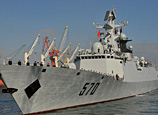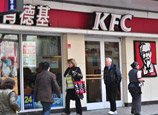
His comments come ahead of an expected visit by French President Francois Hollande to China in late April.
Meanwhile, French Foreign Minister Laurent Fabius paid a two-day visit to Beijing on Friday. He called on President Xi Jinping and held talks with his Chinese counterpart Wang Yi to discuss preparations for Hollande's visit.
Some analysts said the yuan's internationalization, and financial cooperation between China and France, could be among the main topics to be addressed during Hollande's visit.
Noyer considers the yuan's internationalization initiated by China's top authorities to be the first step toward its full convertibility. "Such an evolution will make the RMB one of the three major international currencies, together with the dollar and euro," he said.
Noyer said Paris has been committed to strengthening its position in corporate bonds and short-term negotiable debt securities markets as well as the associated trading infrastructure, to promote wider use of the yuan.
French companies are among the most active European issuers of yuan-denominated bonds, which offers Paris an advantage to promote the yuan trading business, said Arnaud de Bresson, chief executive of Paris Europlace, a professional association that supports the French financial industry and promotes Paris as an international financial center.
In 2011 and 2012, the total value of offshore yuan-denominated bonds issued by French corporates was nearly 7 billion yuan, twice the value of bonds issued by their British counterparts, according to a report by Paris Europlace.
 |  |
















 WWII TV dramas border on the ridiculous
WWII TV dramas border on the ridiculous


![]()
